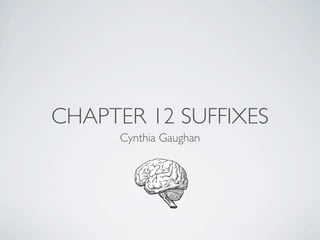
Chapter 12 presentation
- 1. CHAPTER 12 SUFFIXES Cynthia Gaughan
- 2. -PHASIA Suffix pertaining to speech
- 3. APHASIA • Inability to communicate through speech • Due to damage of specific areas of the brain • Languageinvolves almost the entire area of the association cortex on the left side of the brain
- 4. IMPORTANT LANGUAGE REGIONS • Broca’s Area- If a lesion occurs in this area, a person can understand language but has difficulty speaking. It can also affect writing, typing, and sign language. • Wernicke’s Area- If a lesion occurs here, a person is able to speak, but in a nonsensical manner, sometimes known as “word salad”. They have a difficulty comprehending language.
- 5. CAUSES OF APHASIA • Stroke • Head injury • Brain tumor • Infection • Dementia
- 6. -ESTHESIA Suffix pertaining to feeling or sensation
- 7. PARESTHESIA • Burning, prickling, tingling, or numbness- “pins and needles” • Temporary paresthesia occurs when sustained pressure is placed on a nerve, such as when a person keeps his legs crossed for too long- will fade when pressure is released • Chronic paresthesia is a sign of neuron malfunction or nerve damage
- 8. CAUSES OF CHRONIC PARESTHESIA • Stroke • Whiplash • Transient ischemic attack • Hypothyroidism (TIA) • Fibromyalgia • Multiple sclerosis (MS) • Tumor pressing against brain • Lyme disease or spinal cord • Diabetes
Editor's Notes
- \n
- \n
- \n
- \n
- \n
- \n
- \n
- \n